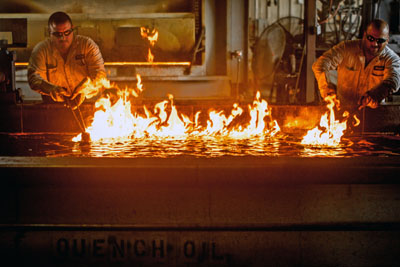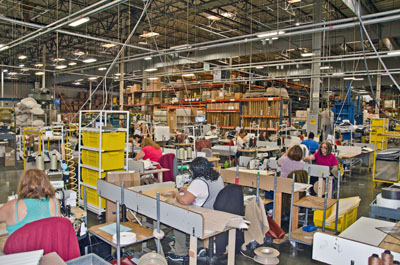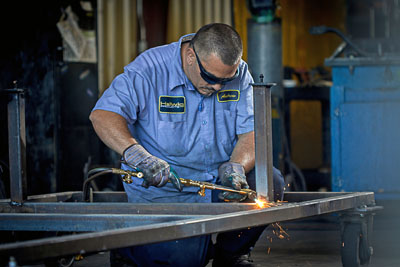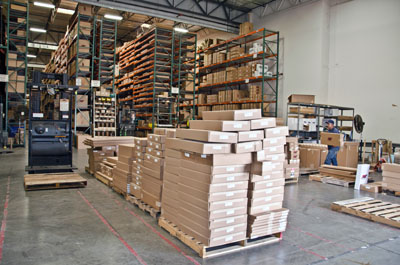SEMA News—December 2015
BUSINESS
Private Labeling
Making the Most of Manufacturing Capacity
Photo courtesy of Hellwig Products. |
Efficiency is paramount to manufacturing companies. Exploiting the full capacity of available tooling and resources maximizes bottom-line profits. For some companies, peak efficiency is derived from adding a private-labeling operation to their product offerings.
In the automotive specialty-equipment market, as in other industries, products manufactured by one company and then sold to and offered under another company’s brand are known as private-label goods. In the grocery industry, for instance, a food producer may process, package and label a given product for sale under a chain store’s own label. The store’s private-label brand then becomes known as a commodity unto itself.
“Private labeling gives entrepreneurs who don’t have the capital to purchase machinery, technology and engineering the ability to use an established manufacturer to supply products,” said Anthony Thompson, president of Nutek Wheels. “That enables the customer company to focus more on branding and marketing to grow its business. We currently have seven private-label accounts. Many of them sell directly to the public, some wholesale, and many sell through the Internet.”
Private labeling helps manufacturers increase production volume and takes advantage of excess capacity. It allows a manufacturer to use its expertise to quickly develop quality products similar to its own line for other businesses. TMI Products is an example of a company that uses its extensive experience making world-class automotive interiors and related products for third-party customers.
“The advantages of high-quality products without the infrastructure investment are very attractive to the companies we build private-label products for,” said Dean Satterfield, general manager of TMI Products. “It is like having your own factory without having to build it. That allows a company to build and market its brand or product rather than focus on operational issues related to making the product. We are good at what we do, so they don’t have to be. TMI also takes advantage of this same philosophy when we need something to market that we do not make ourselves.”
Photo courtesy of TMI Products. |
Melanie White, vice president of Hellwig Products Co. Inc., said that private labeling also allows companies to be more in control of the reputation of a product line within a market segment, helping to set the stage for standards. If the parent company devotes itself to developing quality products—both for itself and for its private-label partners—it can enhance the entire marketplace. Private labeling, therefore, requires due diligence for both the supplier and the buyer.
Mark Turner, CEO of Daystar Products International, said that a good first step toward developing a private-label operation is to look at the companies you do business with currently.
“Make sure the products fit in your current offering and have the quality you are looking for,” he said. “There are very few products that are original, and if someone wants to sell the product, you can’t keep them from doing it. Embrace the fact that another company feels so strongly about your product that they want to sell it. It’s best to make the sale even if it’s under a private-label program.”
Satterfield noted that his company still sometimes turns down opportunities because they would not be a good fit with TMI’s products or processes.
“There are some companies that cannot produce the private-label product for you in a reliable way,” he said. “And, unfortunately, there is also the potential of an unscrupulous person taking your product and then selling out the back door to your own customers. The main point is to be wise and do your homework.”
Satterfield said that private-label pricing also requires some research and calculations, including the cost of engineering, development, materials and labor.
“TMI provides 100% of the materials for some of our private-label customers, but it may be a mix of customer-supplied materials and components and some items supplied by TMI for others,” he said. “We even make products only up to a point and then ship to the partner company to complete the product.”
Todd Payne, director of international sales and co-manufacturing for MagnaFlow, said that his company begins each private-label project by providing a budgetary estimate to its partner, with the estimate based on R&D time, materials costs, annual consumption, part number life expectancy and production intricacy.
Thompson said that volume also comes into the pricing equation for Nutek’s private-labeling operations.
“We have different tiers determined by how much of our capacity they take up,” he said. “That includes everything from the forgings and hardware to finishing and shipping. We have contracts that hold both parties accountable, ensuring that we meet our lead-time commitment and they are able to make their sales commitment.”
Packaging and labeling may also add to costs and depend on the customer’s preference and capabilities.
“Having a private-label product come in ready to sell is a big plus,” Satterfield said, “but that complete solution is more costly. We package, label and ship hundreds of items every day, many of which are private labeled, so the expertise is there for a turnkey solution. However, we also provide bulk packing and shipping of finished products and components to transport to
other assembly facilities or the brand company facility.”
On the other hand, Nutek does all the packaging and labeling for its private-label operations.
“The private-label customer just provides a template to us,” he explained. “Some of our private-label accounts come and pick up their products, but we also ship directly to some of our private-label accounts’ customers. We have different UPS and FedEx accounts based on our different private-label contracts. We use their account numbers and label printouts that show their business and their customer.”
Photo courtesy of Hellwig Products. |
There are also differences in the way various companies handle private-label marketing. White said that Hellwig’s private-label partners handle their own branding and marketing. Satterfield said that TMI can and does market some private-label products, but most do their own marketing.
“TMI remains invisible to their customers in this relationship, although we stand behind the products we make, whether under our brand name or the customer’s,” he said. “Sometimes changes are made to distinguish a brand-name product from the identical private-label product, although each is made with the exact same materials and processes. Brand-name tags or package labeling can be added to maintain
brand identity.”
Distribution of private-label products is, for the most part, unfettered. Most manufacturers consider such products as unique and wholly owned by the contracting company. In addition, Payne said that MagnaFlow’s private-label parts are available for purchase only by the customer who initiated the development of the product, and that customer is therefore empowered to sell or redistribute that product to whomever it chooses and at the price it chooses.
Thompson said that Nutek’s private-label partners also maintain the engineering rights to all of their drawings, even though his company’s personnel did the actual development.
“Some of them may give us no more than a sketch on a piece of paper and say they want a wheel that looks like the sketch, and we will have our engineers come up with several iterations to develop a final product,” he said. “We also do complete testing so that the final product meets our quality standards. But at the end of the process, it’s their product. The most important thing is that there are quality multi-piece wheels available to end consumers. In too many private-label companies, there is not enough emphasis on safety and engineering.”
One problem with supplying that type of service is that some private-label customers simply don’t understand what goes into manufacturing a product.
“A customer may have an idea of how they’d like a wheel to look but not realize how much engineering or machining goes into it,” Thompson said. “In some cases, a design simply cannot be made into an actual wheel. I would advise private labelers to spend time at the manufacturing site to see what actually goes into producing the product. They should meet the engineering team and the design team and understand how much back-and-fourth there is, how much strength testing and fatigue testing there is, so that they really understand the manufacturing process.”
Photo courtesy of TMI Products. |
Satterfield said that some of TMI’s private-label products are restricted by minimum advertised pricing policies because a premium name brand cannot afford to have identical product selling for significantly less.
“We know a dealer who sells identical products for two different prices,” he said. “One is the name brand, which uses the product logo and has an advertising co-op allowance, and the other is a ‘replacement no-name brand’ for 15% less. They have huge sales for both brands.”
Payne said that MagnaFlow generally has very few issues with its private-label business competing with the standard MagnaFlow production offerings. In fact, MagnaFlow has shifted away from a traditional private-label framework to a co-manufacturing structure in order to protect the parent brand.
“If we build a product now, our brand is represented somewhere on it,” Payne said. “The vast majority of our partners understand the value and quality that our brand stands for, and that actually appeals to them strongly when it comes to seeking a manufacturing partner for their project. Our co-manufacturing philosophy invites our partners to approach us for unique products that are significantly different from what they already have access to from our catalog. Projects may be driven by aesthetics, application coverage, performance, unique fitment requirements or a myriad of other inputs as well as a mixture of several of them.”
Satterfield said that a consistent marketing presence is key to protecting the parent brand from being cannibalized by a private-label product.
“Recognition and trust of the parent brand must continue to be built upon, otherwise brand confusion and customer apathy may set in,” he said. “Running parallel name-brand and private-label products is a strong strategy to serve the buyer of the higher-priced reputation brand and the lower-priced value buyer. Both need and want the same product but are motivated by different values or budgets.”
He cited Seiko watches as a prime example. The company builds excellent quality watches in a higher price range while also producing internal movements for many other watch companies, including some high-volume/low-price brands.
“Buying a non-Seiko brand with the quality of a Seiko inside builds enormous sales volume,” he said. “The Seiko brand is well established and respected, yet much of Seiko’s volume comes from the millions of internals they sell as private-label components.”
While there are obvious benefits to private labeling for companies that have access to untapped manufacturing capacity, there are also pitfalls to be avoided. One is focusing so much attention on the private-labeling enterprise that the parent brand begins to suffer.
“Unless the intent is to become solely a supplier to other brands, you should be careful to protect your own name and not dilute company capabilities and brand value by selling all your capacity and good will to your customers,” Satterfield said. “Brand-name value can have strong bottom-line contribution and return on investment, but some companies may actually find that the role of behind-the-scenes support manufacturer suits them well and supports strong financials.”
In the end, he said, private-label manufacturing and distribution can be a win-win for all concerned, including the name-brand factory, the distributor, the private-label brand and the consumer, serving all customer wants, needs and desires.










